Strategy (Stance, Approach, Risks and Opportunities)
- Basic Concept
- Approach to Environmental Issues and Our Long-term Vision
- Environmental Medium-term Plan
Basic Concept
The planet’s air, water, land, and other elements interact with each other to form a healthy foundation for the survival of living things and a rich biodiversity. Moreover, humankind and economic activities develop sustainably through the use of the Earth’s valuable natural capital and the social capital generated in the course of wide-ranging activities. SEKISUI CHEMICAL Group is working to help create this kind of planet and society and has positioned the environment as a materiality (key focus area) of its ESG management.
We have also identified long-term targets and initiatives in our Long-term Environmental Management Vision, SEKISUI Environment Sustainability Vision 2050. Recognizing climate change, resource recycling, and water-related risks as important issues, we are promoting efforts to reduce GHG emissions and promote the recycling of resources. Not to mention the need to prevent further deterioration of natural capital, including steps to reduce the impact on ecosystems, we are endeavoring to provide returns to natural and social capital through such measures as the expansion of Products to Enhance Sustainability sales and are engaging in business activities on a daily basis with the aim of realizing an earth with maintained biodiversity.
SEKISUI CHEMICAL Group recognizes climate change as its most important challenge. Here, we reanalyzed the risks and opportunities related to this issue. In response to efforts aimed at accelerating targets as a result of initiatives taken to date, we also revised our strategy based on the roadmap laid to maintain the increase in temperature to less than 1.5°C in fiscal 2022, the final year of our previous Medium-term Management Plan. In addition, we acknowledge the critical need to reduce greenhouse gas emissions not only in our corporate activities, but also across the supply chain as a whole in order to contribute to the realization of a truly decarbonized society. With this in mind, we have adopted a strategy that prioritizes resource recycling and are strengthening efforts in collaboration with the supply chain.
Under the Medium-term Management Plan starting from fiscal 2023, we will focus on certain key points. These points include the following:
- Accelerate the shift to renewable energy for purchased power and reduce fuel-derived GHG emissions in a bid to address the risks associated with climate change
- As far as resource recycling is concerned, focus on the resource conversion of raw material resins and increasing the material recycling rate for waste plastics
- From a water-related risk perspective, place particular emphasis on reducing water intake volume and COD emission volumes while minimizing the impact of our business
Furthermore, we will renew our understanding toward the interrelated nature of such environmental issues as climate change, resource recycling, water-related risks, and biodiversity, and bolster efforts to consider solutions that do not involve trade-offs throughout the product lifecycle as we carry out these endeavors.
-
Note: Natural capital:A term that refers to physical resources from nature, such as soil, air, water, minerals, flora and fauna, as well as biological capital, human capital, and social capital.
-
Social capital:A term that refers to the social infrastructure and facilities that form the basis of production activities and living environments, such as roadwork, housing, ports, airports, railroads, water supply and sewerage systems, public parks, educational facilities, social welfare facilities, electricity, gas, and hospitals.
- Please refer to Environmental Management Policy.
Risks and Opportunities
SEKISUI CHEMICAL Group assesses the impact of the environment on companies as well as the scale of impact that companies have on the environment, determines the importance of risks, and sets priorities to be addressed.
As far as the risks and opportunities associated with environmental issues are concerned, we assess the scale of economic impact on companies with respect to transition and physical risks.
Transition risks are those that arise when policies and regulations that support the resolution of environmental issues are strengthened, resulting from delays in response to policy and technological changes. On the other hand, if we take the lead in tackling environmental issues, we will quickly respond to the needs of society, which will become increasingly demanding in the future. This in turn will lead to opportunities to acquire additional markets through cost reductions and technological changes.
Physical risks are those that arise from physical changes in the external environment when environmental issues, especially climate change, are not successfully resolved. Meanwhile, reducing this risk will increase corporate sustainability, while at the same time developing products and services that mitigate this risk will lead to opportunities.
Specific risks and opportunities are extracted using the scenario-based analysis method recommended in the TCFD Guide. This scenario analysis was conducted using two axes.
One axis was based on a social scenario centered on climate change with temperatures of not less than 4°C or not more than 1.5°C. We have determined that climate change issues are correlated with other environmental issues and have the greatest impact on social scenarios. Here, we use this common axis as an axis when setting up scenarios based on overall environmental issues.
The other axis was based on the decentralization of social systems in rural areas or concentration in large cities. In the Group’s four business domains (Residential, Advanced Lifeline, Innovative Mobility, and Life Science), we conducted statistical processing based on a survey of internal and external experts for events that fluctuate widely in their feasibility. Then, we extracted what kind of events could be considered in the four social scenarios of the four quadrants based on two axes. With a focus on climate change, we predicted how the impacts of resource recycling, water-related risks, and biodiversity will change the future.
These analyses are reviewed once a year in light of social trends related to environmental issues, the policies of each country, and status of the Group. As a result of the above analyses, the following risks and opportunities are considered.
- Increase in energy procurement costs due to carbon tax hikes and a decrease in sales through adjustments to product pricing
We recognize this as a policy-related transition risk that has a significant impact on the Group as a whole. On the other hand, we recognize the prospect of capturing business opportunities by taking measures at an early stage compared with other companies and other company products. One such opportunity is the stabilization of energy costs through the conversion to renewable energy. - Conversion of low-carbon materials and processes to meet the growing market demand for a shift to low-carbon products
We see this as a technology-related transition risk that has a significant impact on the Group as a whole.
On the other hand, we recognize the potential for business expansion, including growth opportunities for Products to Enhance Sustainability that contribute to low carbonization and business growth by prioritizing the procurement of resource recycling friendly designed products. - Increase in damage caused by typhoons, torrential rains, droughts, etc., and decrease in sales
We recognize this as an acute physical risk that has a significant impact on the Group as a whole resulting in an increase in damage caused by such incidents as plant shutdowns as well as a decrease in sales, etc. Meanwhile, we see opportunities in the growing need to strengthen infrastructure, the prospect of an increase in sales of Products to Enhance Sustainability in high water risk areas, and an upswing in the need for disaster-preparedness facilities. - Opportunity loss due to changes in consumption behavior, preferences, etc.
As a market transition risk, we recognize the possibility for opportunity loss due to a decline in the number of new vehicle sales and a lack of access to resource recycling and decarbonization incentives. As such, changes in consumer behavior and preferences may significantly impact the Group as a whole. In contrast, we recognize the opportunity to gain incentives through resource recycling and the visualization of decarbonized value as well as an increase in profitability from the shift to higher-performance products.
Approach to Environmental Issues and Our Long-term Vision
Long-term Environmental Management Vision, SEKISUI Environment Sustainability Vision 2050
SEKISUI CHEMICAL Group contributes to solving a variety of natural and social environment issues through its corporate activities, products, and business in order to realize an earth with maintained biodiversity. We recognize that we are conducting our corporate activities using the earth’s natural capital as well as meaningful social capital from society. We are therefore committed to accelerating efforts aimed at returning such capital back to the environment and society while collaborating with stakeholders.
Our goal is to create an earth with maintained biodiversity. This earth cannot be realized without a society in which various issues related to the natural and social environments have been resolved. I believe that this is the same as our stance toward achieving the SDGs in 2030.
The following three activities are important for the Group to contribute to the resolution of issues.
-
1.Expand and create markets for Products to Enhance Sustainability*1
-
2.Reduce environmental impact
-
3.Conserve the natural and social environments*2
- For details, please refer to Products to Enhance Sustainability.
- For details, please refer to Social and SDGs Contribution Activities.
- Out_E01
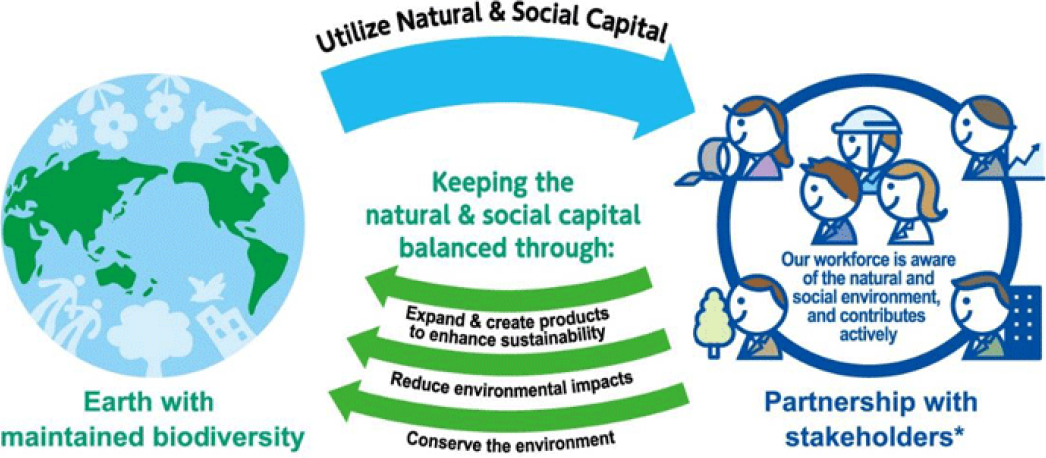
*Stakeholders: "Customers", "Shareholders", "Employees", "Business partners", "Local Communities and the Environment"
In order to revitalize our activities and accelerate efforts to resolve issues, the Group believes that it is necessary for each employee to be aware of different environmental issues and not only to become a group with a strong ability to contribute to solving issues, but also to promote activities in partnership with all stakeholders.
Backcasting from our vision for 2050, we set milestones on a medium-term basis, and established an environmental roadmap.
In fiscal 2023, we promoted initiatives based on this environmental roadmap.
- What kind of situation will we achieve over the medium term by tackling environmental issues?
- Key actions to be taken and medium-term milestones
- Out_E02
Environmental Roadmap
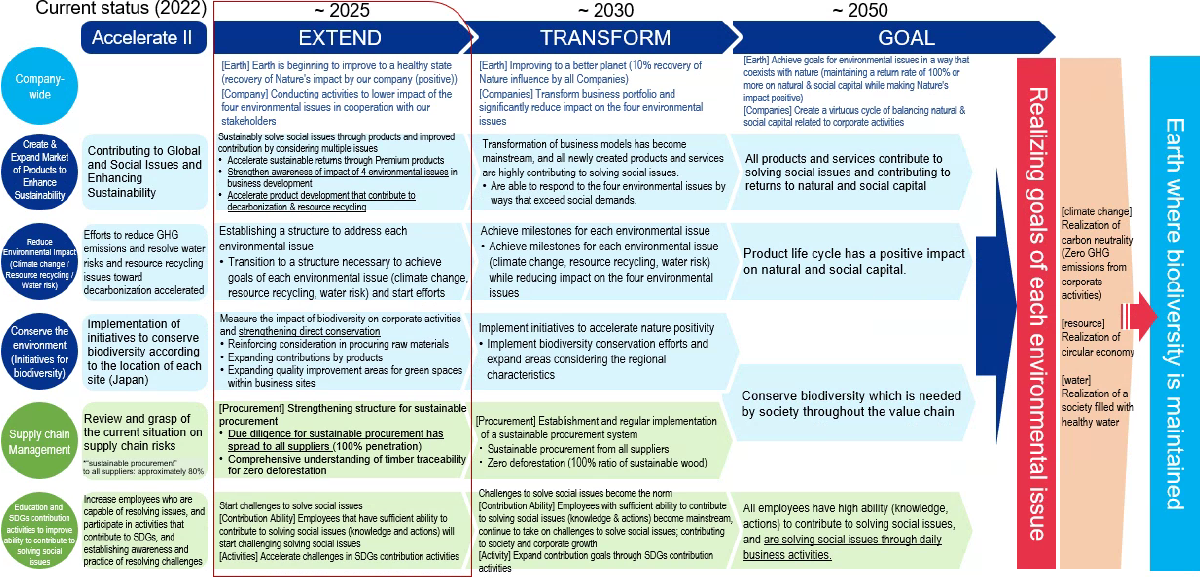
Long-term Goals for Each Environmental Issue
In order to realize an earth with maintained biodiversity targeted under our Long-term Environmental Management Vision, we have identified the following environmental issues that are particularly important, and the goals we aim to achieve by 2050.
[Environmental issues]
- Climate change: Achieve zero greenhouse gas emissions that arise from business activities (achieve carbon neutrality)
- Resource recycling: Achieve a circular economy
- Water-related risk: Realize societies with abundant access to clean water
By achieving all of these environmental issue-related long-term goals, we aim to achieve
- Biodiversity: An earth with maintained biodiversity (realize nature positivity).
- Out_E03
Long-term Goals for Each Environmental Issue
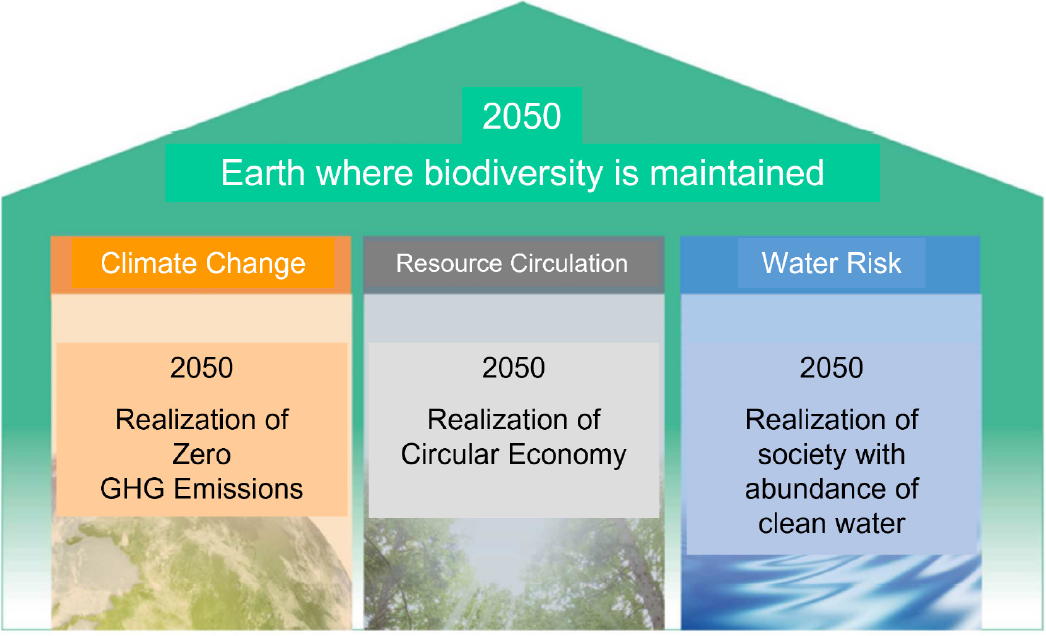
For each environmental issue, we have drawn up a roadmap backcasted from our goals in 2050, and have set medium-term milestones. Environmental issues are interrelated, and choosing and promoting solutions that do not involve trade-offs will lead to the simultaneous realization of long-term goals. For this reason, we will focus on improving the quality of solutions to environmental issues under our current Medium-term Management Plan.
- Out_E04
Correlation between Environmental Issues
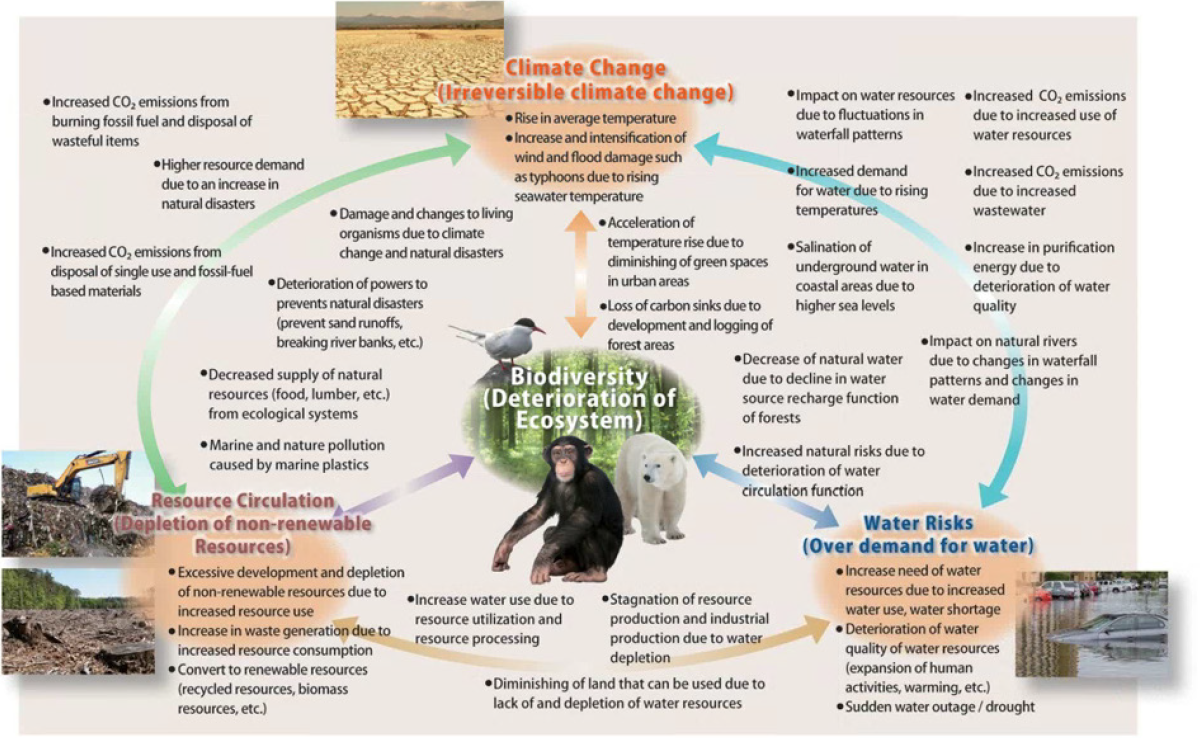
- Out_E05
Trends in Environmental Issue Initiatives Enhancement Points
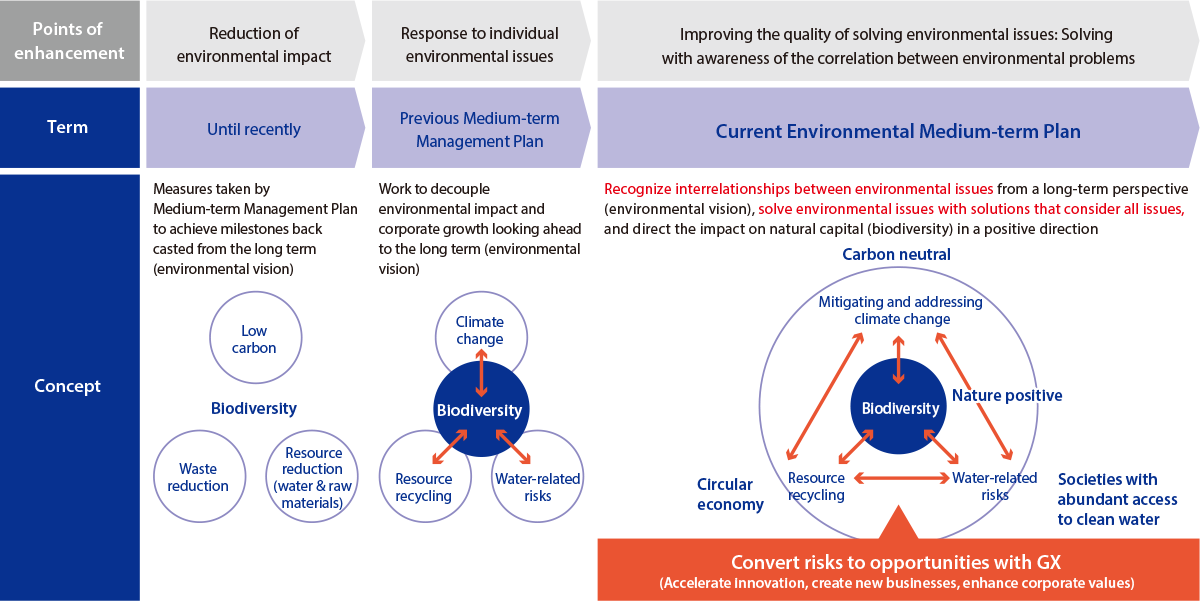
Environmental Medium-term Plan, SEKISUI Environment Sustainability Plan: EXTEND (2023-2025)
SEKISUI CHEMICAL Group is promoting SEKISUI Environment Sustainability Plan: EXTEND, its environmental medium-term plan that covers the three years from fiscal 2023. As previously mentioned, using backcasting to achieve the goals we have set for 2050 in our Long-term Environmental Management Vision, SEKISUI Environment Sustainability Vision 2050, we are aiming for milestones established for the Medium-term Plan and implementing initiatives for each important working item.
The key environmental issues that the Group must address are climate change, water-related risk, and resource recycling. With regard to biodiversity, which is directly or indirectly related to these issues, we recognize the importance of understanding the issues and working to progress of biodiversity conservation.
In order to accelerate the resolution of issues aimed at achieving our long-term goals, we have set creating and expanding the market for Products to Enhance Sustainability, reducing environmental impact, and environmental conservation" as items on which to focus.
We have also established the following items as specific measures to be taken.
- Supply chain management
- Improve employees' ability to contribute to solving social issues
Under the current Mid-term Management Plan, we are promoting initiatives to achieve the following targets.
Important measures and targets
-
Improving the rate of return of natural and social capital
Monitoring progress with the integrated index, SEKISUI Environment Sustainability Index: Maintaining a rate of return to natural capital of 100% or more -
Improving global and social sustainability through our products
Net Sales of Products to Enhance Sustainability: In excess of ¥1 trillion -
Tackling climate change issues
[Decarbonization]
Renewable energy as a percentage of purchased power: 70%
Reductions in greenhouse gas emissions: 33% or more (compared with FY2019) -
Efforts to address resource depletion issues
[Promote resource recycling]
Recycling rate for waste plastics: 65% (Japan) -
Initiatives to address water-related risk issues
[Preservation of water resources]
Water intake volume at production sites that use large amounts of water: 10% (medium-term three-year period) (compared with FY2016)
Total volume of COD discharged into rivers by production sites where discharge is substantial: 10% (medium-term three-year period) (compared with FY2016)
[Minimizing water risk]
Implement initiatives to minimize impacts at business sites with a significant business impact due to water risk -
Improving the ability of employees to contribute to solving issues
Promote education and training
Promote activities that contribute to SDGs
Summary of Crucial Action Items in the Current Environmental Medium-term Plan
Products to Enhance Sustainability
The Environment-Contributing Products program, which preceded Products to Enhance Sustainability, was launched in 2006. Since then, we have registered products that make a significant contribution to solving environmental issues based on internal standards. We have made a commitment to society to increase the ratio of Group-wide products registered, and have promoted the creation of products that solve social issues while working to expand the market. From the beginning of the program's operation, the Group has aimed to accelerate the resolution of environmental issues through products and realize a balance between ecology and economy.
In fiscal 2017, we expanded the scope of Environment-Contributing Products to include not only the natural environment, but also the social environment, including human and social capital. Our goal is to improve people's lives and the global environment. We believe that it is essential to resolve the issues set out in the SDGs adopted by the United Nations in 2015. This includes promoting well-being and health and securing resilient infrastructures to improve people's lives as well as mitigating and responding to climate change to improve the global environment. We are focusing our efforts on solving these issues.
In fiscal 2020, the name of the product program was changed to Products to Enhance Sustainability. This measure was designed to improve the Group's sustainable management capabilities and profit-generating capacity to sustainably solve social issues, including the environment, and to grow as a Group by solving social issues. At the same time, the following two systems have been launched.
-
・ Sustainability Assessment:To improve the sustainability of companies and products, we confirmed and assessed social responsibilities and risks, including governance (internal control), customer satisfaction, and environmental considerations in the development process, across the supply chain. We identify areas that need improvement and reinforcement, and use this information to implement each item.
In particular, environmental issues include reducing greenhouse gas emissions from raw material suppliers, procuring from sustainable forests, and confirming that consideration is given to environmental issues from raw materials to disposal. -
・ Premium Framework:We have set this as a strategic framework for products that contribute to solving social issues, including environmental issues, and that strategically grow products that are driving profits.
Climate Change Issues
With regard to the issue of climate change, we have set a long-term target of zero greenhouse gas emissions by 2050. In order to achieve this goal, we have drawn up a path to achieve the 2°C target. We were able to achieve the milestones set in the roadmap for greenhouse gas reduction halfway into the previous Medium-term Management Plan (fiscal 2021). As a result, we revised our roadmap to achieve a target of 1.5°C with the aim of accelerating our efforts.
We have not changed our milestone of converting all purchased power (Scope 2) to renewable energy by 2030. However, we will also focus on reducing greenhouse gas emissions with a view to switching to alternative fuels, and aim for a 50% reduction compared with fiscal 2019.
Under the current Medium-term Management Plan, we will actively promote the reduction of fuel-derived greenhouse gases, in addition to the conversion of electricity used at production plants to renewable energy. We have identified the period from fiscal 2023 as the time for production process innovation. Our goal is to convert 70% of purchased power to renewable energy, and are continuing to implement measures to support this conversion. For fuel-derived sources under Scope 1, we are continually promoting energy conservation activities at our production sites, including more efficient operations and energy conversion to electricity by replacing aging facilities.
Products manufactured under these initiatives are low-carbon products that emit low levels of GHGs throughout the product life cycle. We are working diligently to create and expand markets for Products to Enhance Sustainability with a low carbon footprint (CFP) for use in products that allow customers to engage in low carbon manufacturing and ultimately to a decarbonized society. In order to reduce GHG emissions throughout the product lifecycle, it is vital to reduce GHG emissions (Scope3) in the supply chain.
In upstream corporate activities, we are calling on the cooperation of suppliers and strengthening efforts to convert to non-fossil-based and recycled raw materials in a bid to reduce raw material-derived GHG emissions. In downstream corporate activities, we are endeavoring to increase the sales ratio of net-zero energy houses (ZEH) and are promoting increased awareness toward the recovery and disposal methods of used products at the product and business model design stages in order to reduce GHG emissions at the time of products use.
As far as disposal methods at the product disposal stage are concerned, we are engaging in a variety of activities. This includes coordinating with waste contractors and the industry as well as refining proprietary technologies. One such technology to emerge from these efforts is the Group’s Biorefinery (BR) technology that produces ethanol from waste using microorganisms.
Taking the aforementioned into consideration, the Group recognizes that resource recycling contributes significantly to the reduction of Scope 3 emissions, and is promoting initiatives accordingly.
Water-related Risk Issues
In fiscal 2020, we set realizing societies with abundant access to clean water as our goal for 2050. We set milestones for priority items by backcasting and formulated a roadmap for water-related risk reduction. Based on the aforementioned, we will continue to reduce the volume of water consumed throughout the Group and promote recycling, while also working to improve the quality of water discharged into rivers based on COD indicators. In addition, we work to ascertain water-related risks specific to each region and formulate and implement risk reduction measures tailored to the region for sites with high risks.
As far as efforts to mitigate water intake risks are concerned, we recognize that one measures is to incorporate water intake risks in the formulation of BCPs at each production and business site. This is also an effective measure in efforts to adapt to climate change.
In addition to such environmental management measures as the prevention of pollution during both regular and non-regular periods, efforts to improve the quality of wastewater are also one measure to reduce water discharge risk. We recognize that these endeavors will help reduce the negative impact on biodiversity.
Through these measures, we will strive to improve the water environment in basins centered on production sites and reduce water-related risks in the supply chain, thereby reducing water-related risks for companies and society.
Looking in particular at the supply chain, we will share and recognize risks through dialogue with suppliers (Environmental Due Diligence) while working together to consider and implement measures to improve risks in an effort to reduce the water-related risks associated with the raw materials procured.
Resource Recycling Issues
With regard to resource recycling, we will strive to reduce the total amount of waste, even as the scope of our operations doubles toward 2030. At the same time, we will focus on recycling and promote initiatives to realize a recycling-oriented society and a circular economy by 2050. Recognizing that efforts to recycle resources in the supply chain are indispensable to realizing a decarbonized society, we formulated a resource recycling policy, strategy, and a resource recycling roadmap to achieve a circular economy in 2050 in fiscal 2020.
With innovation centered on the creation of Products to Enhance Sustainability for resource recycling, we have initiated steps to strengthen our efforts to convert existing products into raw materials and to recycle valuable materials from waste discharged in the production process.
From a waste recycling perspective, we are considering and promoting in-house measures so that we can select high-quality material recycling methods. Among a host of endeavors, we are evaluating the degree to which we contribute to other environmental issues, including the reduction of GHG emissions, conservation of biodiversity, and recycling.
As a technology to accelerate resource recycling not only in-house, but also in society, we established and demonstrated a Biorefinery (BR) technology to produce ethanol from waste using microorganisms. Moving forward, we will continue to work toward social implementation.
We believe that solutions to environmental issues will accelerate as the entire supply chain works together. We will develop and implement measures that emphasize supply chain management that spans the lifecycle of our products.
In order to realize a recycling-based society, it is necessary for society to recognize the value of recycled raw materials, biomass, and their use in products, and to acknowledge activities that were previously treated as external diseconomies as economic costs.
In order to raise social awareness, the Group is vigorously participating in and driving activities through various rule-making and other initiatives, including the certification of recycled products and recycling processes.
Biodiversity Issues
SEKISUI CHEMICAL Group’s Long-term Environmental Management Vision is to realize an earth with maintained biodiversity where the ecosystem hierarchy is kept healthy and in a nature-positive state. We believe that this goal will be achieved when all environmental issues are resolved.
The Group recognizes the dependence and impact its corporate activities have on natural capital, and strives to maintain returns that exceed the natural capital used. Going forward, we will reduce the dependence and impact on natural capital from the perspective of five impact drivers (climate change, resource consumption, water and land use, pollution, and invasive species) that affect natural capital through corporate activities. Specifically, we will implement the following seven measures.
<Providing returns to natural capital through corporate activities>
-
1.Review manufacturing processes
-
2.Review nature-positive product design
-
3.Increase contribution through Products to Enhance Sustainability
<Supporting returns to natural capital by society>
-
4.Strengthen initiatives for raw material procurement
-
5.Support social change
<Accelerating returns to natural capital in corporate activities and society>
-
6.Human resource development
-
7.Coordinate with stakeholders
Furthermore, with regard to biodiversity issues, we recognize the importance of ensuring that the impact imposed by corporate activities is positive based on the concept of no net loss. At the same time, it is equally important to understand the impact of each area, and to not only reduce any negative impact, but to promote a positive result. As with other environmental issues, we will also consider activities that include initiatives that encompass the supply chain.
